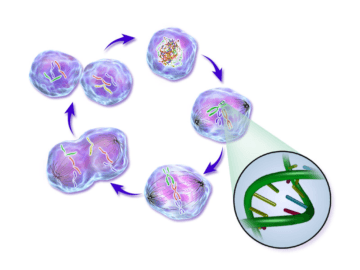NCI Staff in Cancer.gov:
 At the heart of all cancers is a fundamental problem: a cell—and eventually innumerable cells—that won’t stop dividing. This runaway growth is what forms a tumor, and the abnormal cellular processes that drive this growth can help tumors withstand the cancer treatments intended to kill them. Despite more than six decades of research into the mechanisms that cells use to divide, some of the nuts and bolts of the process remain a mystery. Scientists want to better understand these mechanisms in hopes of targeting them and potentially shutting down the uncontrolled growth of some tumors. New research from three collaborating teams of scientists in the United States and Europe appears to have found one of these mechanisms, uncovering a previously unknown check on dividing cells: a protein called AMBRA1. By limiting tumor growth, the researchers showed, AMBRA1 serves as an important tumor suppressor—as these types of molecules are often called—in healthy cells.
At the heart of all cancers is a fundamental problem: a cell—and eventually innumerable cells—that won’t stop dividing. This runaway growth is what forms a tumor, and the abnormal cellular processes that drive this growth can help tumors withstand the cancer treatments intended to kill them. Despite more than six decades of research into the mechanisms that cells use to divide, some of the nuts and bolts of the process remain a mystery. Scientists want to better understand these mechanisms in hopes of targeting them and potentially shutting down the uncontrolled growth of some tumors. New research from three collaborating teams of scientists in the United States and Europe appears to have found one of these mechanisms, uncovering a previously unknown check on dividing cells: a protein called AMBRA1. By limiting tumor growth, the researchers showed, AMBRA1 serves as an important tumor suppressor—as these types of molecules are often called—in healthy cells.
The new work shows that AMBRA1 marks other proteins involved in helping cells divide (known as cyclins) for destruction when cell division isn’t needed. When the gene that produces AMBRA1 is damaged and the protein is missing or doesn’t work properly, the cell cycle loses one of its main brakes, potentially letting cell division spiral out of control. The loss of the AMBRA1 protein, the researchers found, can drive tumor formation in mice and is linked with worse outcomes in some human tumors. They also reported that a lack of AMBRA1 may make some tumors resistant to drugs called CDK4/6 inhibitors, which are a promising new class of cancer treatments. The new research may point to potential strategies for blocking the runaway cell division caused by loss of AMBRA1 and for re-sensitizing cancer cells to CDK4/6 inhibitors. The results from all three studies were published on April 14 in Nature.
More here.
